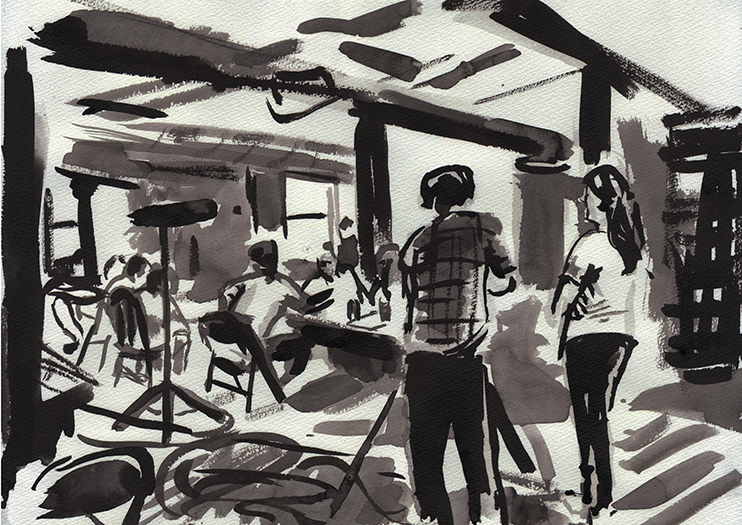Oh, but life went gayly, gayly
In the house of Idah Dally;
There were always throats to sing
Down the river bank with spri-
“Hang on a second guys,” Anderson Lawfer broke in. “So one thing I want to try here. Jaz, could you try it with a little more, just more jazz?”
“OK,” Jaz — James Anthony Zoccoli — said as the 1920s barroom scene broke up.
We were in Nowhere.
Nowhere is the troupe’s nickname for the space above Strawdog Theatre. It was a collection of stage furniture and old lights, high stacks of plywood for future sets, bar stools hanging from coat hooks, thick ventilation tubes, tables marked in tape for what stage prop and what stage makeup goes where.
And on this sunny afternoon last week, it also held the cast of “1001 Afternoons in Chicago,” a radio play of Ben Hecht’s stories put on by Strawdog and Access Contemporary Music.
The show is tomorrow night at Architectural Artifacts in Ravenswood. I’ll put a link for tickets below. You should go.
I’ve been tracking this production for months, since a former profilee on this site let me know it was happening.
I sat down in March with Seth Boustead of ACM, the originator of the project. Boustead and fellow composer Amos Gillespie wrote the jazz-inspired rags and tunes that will bring one story into another as it brings us into the world.
In April, I hung out with Anderson Lawfer and Mike Dailey of Strawdog, the guys in charge of the crew turning Hecht’s 92-year-old vignettes into a cohesive, evocative radio play for 21st-century listeners.
And last week, in May, I sat in on a rehearsal, watching the actors and soundmen turn the words into performance for one of the first times.
I’m going to the show tomorrow, too. It’s at Architectural Artifacts in Ravenswood. I’ll put a link for tickets below. You should go.
Up in Nowhere, the cast gathered around the table to read the script. As Lawfer gave tips and advice — and even switched some of the casting for one scene mid-rehearsal — Ben Hecht’s stories came alive.
Jaz did give more jazz to “Don Quixote and His Last Windmill.” A camera and sound crew ran around to capture the rehearsal.
“I think between the music itself and the musicality of all the sounds that’s going on, that will be a lot of really neat stuff to see with the voices,” said Jaz, who will be narrating the Ben Hecht voice of the scenes.
The voices themselves brought the scripts to life. The narrator of the “Thumbnail Lotharios” segment gave a showman, P.T. Barnum air to a piece I had always read with a grim resignation. The speakeasy of “Don Quixote” came to life with a glass-rattling fervor I hadn’t heard in my head but now can’t hear anything else.
The crying baby of “The Mother” and other sundry sound effects were brought to life by two foley fellows, one of whom was named Starr Hardgrove.
“There was a big lengthy discussion with the baby’s cry so we’ll see if that ends up in the final show,” Hardgrove said. “What makes a baby’s cry? I think human voices are the hardest thing to master. Without having just an actual baby there you have to find a sound effect that would actually work. There’s a lot of different avenues you can go to but any time we can do it live, it’s always a good thing.”
Although I didn’t get enough time to meet with the musicians, I plan to change that tomorrow night at the show (Architectural Artifacts … link for tickets … you should go).
It was beautiful. It was weird. It was odd hearing stories I knew told in radio and, I knew was coming, song.
We were part of a tribe hunting Ben Hecht, me with my notepad and they telling their stories from Nowhere.
Buy tickets (did I mention this was coming?)
